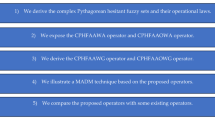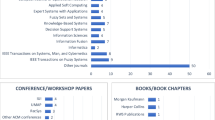Abstract
A novel idea and architecture of a group decision support system for reaching consensus in a group of individuals (agents) is proposed. The core of the system is the preferences modeling and consensus assessment module, which is based on fuzzy logic. However, the focus is on providing the members of the group with an information- and knowledge-rich environment, and tools to make an effective and efficient use of such an environment. This should help the agent gain proper opinions about the issues and opinions and/or attitudes of other agents, articulate proper testimonies, actively contribute to the discussion, and finally make sound and informed decisions that can help constructively run the consensus reaching process. For this purpose modern Web-based technologies are employed and tightly integrated with the core of the system.





Similar content being viewed by others
Notes
Referring to the ontologies we adopt the terminology used by the OWL language specification (http://www.w3.org/TR/owl-ref/).
References
Amgoud L, Bonnefon JF, Prade H (2005) An argumentation-based approach to multiple criteria decision. In: Godo L (ed) ECSQARU. LNCS, vol 3571. Springer, Berlin, pp 269–280
Atanassov K (1986) Intuitionistic fuzzy sets. Fuzzy Sets Syst 20:87–96
Bonnefon JF, Dubois D, Fargie H, Leblois S (2008) Qualitative heuristics for balancing the pros and cons. Theor Decis 65:71–95
Chesnevar C, McGinnis J, Modgil S, Rahwan I, Reed C, Simari G, South M, Vreeswijk G, Willmott S (2006) Towards an argument interchange format. Knowl Eng Rev 21(4):293–316
Carenini G, Moore JD (2006) Generating and evaluating evaluative arguments. Artif Intell 170(11):925–952
Cregan A, Schwitter R, Meyer T (2007) Sydney OWL syntax—towards a controlled natural language syntax for OWL 1.1. In: Golbreich C, Kalyanpur A, Parsia B (eds) OWLED, CEUR Workshop Proceedings, vol 258. http://CEUR-WS.org
Ding X, Liu B, Yu PS (2008) A holistic lexicon-based approach to opinion mining. In: Najork M, Broder AZ, Chakrabarti S (eds) WSDM. ACM Press, London, pp 231–240
Dubois D, Gottwald S, Hájek P, Kacprzyk J, Prade H (2005) Terminological difficulties in fuzzy set theory—the case of “intuitionistic fuzzy sets”. Fuzzy Sets Syst 156(3):485–491
Fedrizzi M, Kacprzyk J, Zadrożny S (1988) An interactive multi-user decision support system for consensus reaching processes using fuzzy logic with linguistic quantifiers. Decis Support Syst 4(3):313–327
Franco LA (2008) Facilitating collaboration with problem structuring methods: a case study of an inter-organisational construction partnership. Group Decis Negot 17(4):267–286
Herrera F, Herrera-Viedma E (2000) Choice functions and mechanisms for linguistic preference relations. Eur J Oper Res 120:144–161
Herrera-Viedma E, Martinez L, Mata F, Chiclana F (2005a) A consensus support system model for group decision-making problems with multi-granular linguistic preference relations. IEEE Trans Fuzzy Syst 13(5):644–658
Herrera-Viedma E, Mata F, Martínez L, Pérez LG (2005b) An adaptive module for the consensus reaching process in group decision making problems. In: Torra V, Narukawa Y, Miyamoto S (eds) MDAI. LNCS, vol 3558. Springer, Berlin, pp 89–98
Herrera F, Herrera-Viedma E, Verdegay J (1996) A model of consensus in group decision making under linguistic assessments. Fuzzy Sets Syst 78:73–88
Jameson A, Smyth B (2007) Recommendation to groups. In: Brusilovsky P, Kobsa A, Nejdl W (eds) The adaptive Web. LNCS, vol 4321. Springer, Berlin, pp 596–627
Jindal N, Liu B (2006) Mining comparative sentences and relations. In: AAAI. AAAI Press, Menlo Park
Kacprzyk J (1987) On some fuzzy cores and “soft” consensus measures in group decision making. In: Bezdek J (ed) The analysis of fuzzy information, vol 2. CRC Press, Boca Raton, pp 119–130
Kacprzyk J, Zadrożny S (2001) Computing with words in decision making through individual and collective linguistic choice rules. Int J Uncertain Fuzziness Knowl Based Syst 9:89–102
Kacprzyk J, Zadrożny S (2002a) A group decision support system based on linguistic multicriteria assesments. In: Bouchon-Meunier B, Gutierrez-Rios J, Magdalena L, Yager R (eds) Technologies for constructing intelligent systems 1. Physica-Verlag, Heidelberg, pp 139–152
Kacprzyk J, Zadrożny S (2002b) Collective choice rules in group decision making under fuzzy preferences and fuzzy majority: a unified owa operator based approach. Control Cybern 31(4):937–948
Kacprzyk J, Zadrożny S (2004) Linguistically quantified propositions for consensus reaching support. In: FUZZ-IEEE’2004, Budapest, Hungary, pp 1135–1140
Kacprzyk J, Zadrozny S (2005) Linguistic database summaries and their protoforms: towards natural language based knowledge discovery tools. Inf Sci 173(4):281–304
Kacprzyk J, Yager RR, Zadrożny S (2000) A fuzzy logic based approach to linguistic summaries of databases. Int J Appl Math Comput Sci 10:813–834
Kunz W, Rittel HWJ (1970) Issues as elements of information systems. Technical Report WP-131, University of California, Berkeley
Kushmerick N (2000) Wrapper induction: efficiency and expressiveness. Artif Intell 118(1–2):15–68
Kennedy C (2006) Comparatives, semantics of. In: Encyclopedia of language and linguistics. Elsevier, Amsterdam, pp 690–694
Knublauch H, Fergerson RW, Noy NF, Musen MA (2004) The Protégé OWL Plugin: an open development environment for semantic web applications. In: McIlraith SA, Plexousakis D, van Harmelen F (eds) International semantic Web conference. LNCS, vol 3298. Springer, Berlin, pp 229–243
Lowe DG (1985) Cooperative structuring of information: the representation of reasoning and debate. Int J Man Mach Stud 23:97–111
Martin P, Blumenstein M, Deer PJ (2005) Toward cooperatively-built knowledge repositories. In: Dau F, Mugnier ML, Stumme G (eds) ICCS. LNCS, vol 3596. Springer, Berlin, pp 411–424
Martin P, Jo J, Jones V (2007) Cooperatively updated knowledge bases as an optimal medium to learn, publish, evaluate and collaborate. In: Proceedings of the first international conference of ubiquitous information technology, Dubai, 12–14 February 2007, pp 875–885
Maybury MT, Mani I (eds) (1999) Advances in automatic text summarization. MIT Press, Cambridge
MIT Center for Collective Intelligence (2006). http://cci.mit.edu/research/index.html
Niekrasz J, Purver M, Dowding J, Peters S (2005) Ontology-based discourse understanding for a persistent meeting assistant. In: Proceedings of the 2005 AAAI spring symposium, pp 26–33
Paris JB (1997) A semantics for fuzzy logic. Soft Computing 1(3):143–147
Reed C, Rowe GW (2004) Araucaria: software for argument analysis, diagramming and representation. Int J AI Tools 14(3–4):961–980
Saint S, Lawson J (1994) Rules for reaching consensus: a modern approach to decision making. Pfeiffer
Schafer JB, Frankowski D, Herlocker J, Sen S (2007) Collaborative filtering recommender systems. In: Brusilovsky P, Kobsa A, Nejdl W (eds) The adaptive Web. LNCS, vol 4321. Springer, Berlin, pp 291–324
Schwitter R, Kaljur K, Cregan A, Dolbear C, G, H (2008) A comparison of three controlled natural languages for OWL 1.1. In: Proceedings of the OWLED 2008 workshop on OWL: experiences and directions, Washington, USA, 1–2 April 2008
Selvin A, Buckingham Shum S, Sierhuis M, Conklin J, Zimmermann B, Palus C, Drath W, Horth D, Domingue J, Motta E, Li G (2001) Compendium: making meetings into knowledge events. In: Proceedings of knowledge technologies 2001, Austin, TX, USA
Susskind LE, McKearnan S, Thomas-Larmer J (eds) (1999) The consensus building handbook: a comprehensive guide to reaching agreement. Sage Publications, Thousand Oaks
Szmidt E, Kacprzyk J (2000) Intuitionistic fuzzy relations and consensus formations. Notes Intuitionistic Fuzzy Sets 6:1–10
Szmidt E, Kacprzyk J (2002a) Intuitionistic fuzzy relations and measures of consensus. In: Bouchon-Meunier B, Gutierrez-Rios J, Magdalena L, Yager R (eds) Technologies for constructing intelligent systems: 2 tools. Physica-Verlag, Heidelberg, pp 261–275
Szmidt E, Kacprzyk J (2002b) Using intuitionistic fuzzy sets in group decision making. Control Cybern 31(4)
Szmidt E, Kacprzyk J (2003) A consensus-reaching process under intuitionistic fuzzy preference relations. Int J Intell Syst 18(7):837–852
Tempich C, Pinto HS, Sure Y, Staab S (2005) An argumentation ontology for distributed, loosely-controlled and evolving engineering processes of ontologies (DILIGENT). In: Gómez-Pérez A, Euzenat J (eds) ESWC. LNCS, vol 3532. Springer, Berlin, pp 241–256
Tomobe H, Nagao K (2006) Discussion ontology: Knowledge discovery from human activities in meetings. In: Washio T, Satoh K, Takeda H, Inokuchi A (eds) JSAI. LNCS, vol 4384. Springer, Berlin, pp 33–41
Zadeh L (1983) A computational approach to fuzzy quantifiers in natural languages. Comput Math Appl 9:149–184
Zadrożny S (1997) An approach to the consensus reaching support in fuzzy environment. In: Kacprzyk J, Nurmi H, Fedrizzi M (eds) Consensus under fuzziness. Kluwer, Boston, pp 83–109
Zadrożny S, Kacprzyk J (2003) An internet-based group decision and consensus reaching support system. In: Yu X, Kacprzyk J (eds) Applied decision support with soft computing. Springer, Heidelberg, pp 263–275
Acknowledgments
This work was partially supported by the Ministry of Science and Higher Education under Grant N N519 404734. This work was conducted using the Protégé resource, which is supported by Grant LM007885 from the United States National Library of Medicine.
Author information
Authors and Affiliations
Corresponding author
Rights and permissions
About this article
Cite this article
Kacprzyk, J., Zadrożny, S. Soft computing and Web intelligence for supporting consensus reaching. Soft Comput 14, 833–846 (2010). https://doi.org/10.1007/s00500-009-0475-4
Published:
Issue Date:
DOI: https://doi.org/10.1007/s00500-009-0475-4




